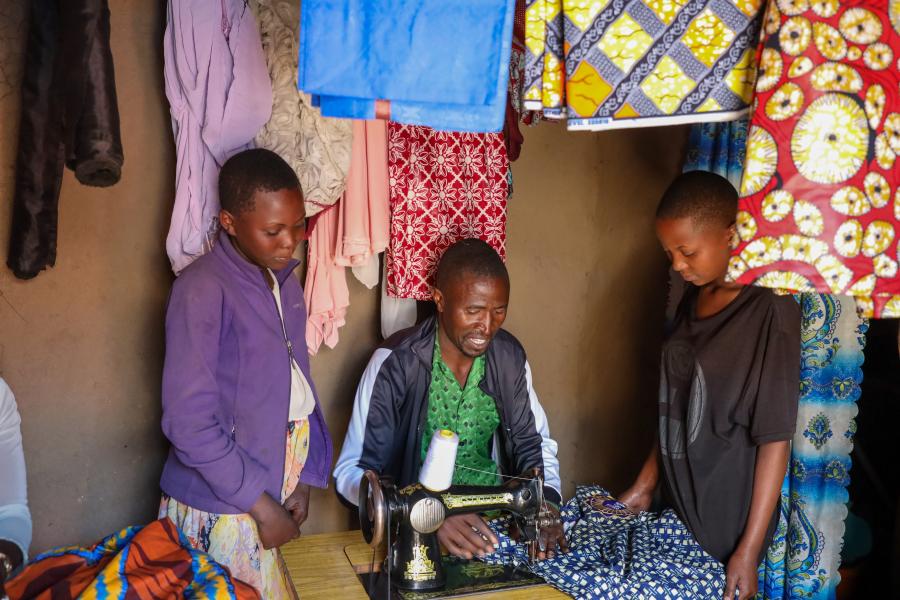The second Global Refugee Forum (GRF) took place in Geneva, Switzerland in December 2023. It was be co-hosted by Switzerland, and co-convened by Colombia, France, Japan, Jordan, and Uganda, together with UNHCR. Participants invited to the GRF represent governments as well as all stakeholder groups identified in the Global Compact on Refugees (GCR), including, most centrally, people who are forcibly displaced or stateless.
The GRF is an opportunity for governments and other actors to show their solidarity with countries hosting refugees and other displaced populations by pledging their support for policies and programmes that advance the objectives of the GCR. A second GRF in December 2023 brought new pledges, setting the political ambition for the protection and solutions agenda for the next four years. It also aimed to ensure the pledges announced since 2019 are further implemented. By the end of October 2023, 33% of pledges reported on by pledging entities had been fulfilled, and 67% were in progress, including long-term policy commitments.
The Forum aims to strengthen the architecture for sustained engagement and support of the international community for refugees and host communities through multi-stakeholder pledges that aim to be transformational, with large-scale reach, and work towards an ambitious common goal supported by a defined resource base, donorship, or financial instrument linked to implementation.
Pledges are under development in support of:
- Engagement across the Humanitarian-Development-Peace Nexus in refugee contexts, including protracted refugee situations;
- Climate action;
- Inclusion in national health and education systems;
- Matching host country policy pledges to enhance protection, inclusion, and solutions;
- Economic inclusion and social protection;
- Increased opportunities for resettlement, family reunification, and other complementary pathways;
- Support for voluntary return and sustainable reintegration;
- Peace building;
- Addressing root causes through the humanitarian, development, and peace nexus;
- Enabling protection, inclusion, and solutions environments;
- Strengthening the quality and availability of data;
- Partnerships, including with refugees and refugee-led organizations.
For example, UNHCR has initiated a climate action multi-stakeholder pledge that aims to ensure that climate action policies are inclusive of refugees, other forcibly displaced and stateless people and their host communities; to increase financing; and generate a flow of programmes that support climate action for hosting countries and communities in climate-vulnerable, fragile and conflict-affected settings.
Another pledge aims to improve economic inclusion and social protection economic inclusion and social protection in 15 countries, support 1,000,000 refugees and host community members, and coordinate research and evidence generation. The pledge is co-led by key donor States (Denmark, Germany, the Kingdom of the Netherlands, and the United States of America), international organizations (OECD, UNICEF, IFC/World Bank), regional organizations (IGAD), and NGOs, including the Refugee Self-Reliance Initiative (RSRI), as well as the Poverty Alleviation Coalition (PAC). Since the initial pledge in 2019 to support 160,000 households to achieve self-reliance by 2023, 132,000 households have been reached. The pledge leaders have invited a number of host countries that have pledged policies to strengthen economic inclusion to join the pledge, which will be announced at the Forum. This grouping convened an “innovation lab” in 2022 to prepare a multistakeholder pledge for the GRF.
In addition, UNHCR plays an intermediary role, bringing host country policy pledges to protect, include, and facilitate solutions for refugees together with financial, technical, and material support provided by governments and other stakeholders for their implementation. A dedicated matching portal, established in late 2022, is a primary source on policy pledges still requiring support. While some steps have been made in pledge matching, there remains significant scope for engagement in this area in 2024. It is foreseen that the multi-stakeholder pledges announced at the GRF 2023 will provide opportunities to facilitate further matching.
The Compact remains a mechanism that can bring together governments and other stakeholders to address the hardships faced not only by refugees, but also by the countries that host them, through a multistakeholder and partnership approach. Refugees and stateless persons are engaged in the identification of needs and opportunities, the development of the multi-stakeholder pledges, and the overall shaping of the GRF programme.
The GCR Indicator Report published in November 2023 shows that although progress has been made since the first indicator report published in 2021, burden and responsibility-sharing remains highly unequal among States at a time when numbers of refugees are growing. The growing refugee situation could be more effectively addressed with the GCR as the blueprint, but efforts need to be scaled up rapidly at all levels, including through the multistakeholder pledges for refugees and host communities that will be announced at the next GRF.
For more information about pledges and contributions within the framework of the Global Refugee Forum, please visit this page.
